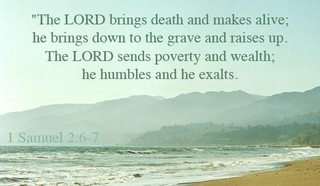
- Recent Translations
- All Translations
1 Samuel 2:27 Meaning and Commentary
And there came a man of God unto Eli
A prophet, as the Targum; he had gifts and graces bestowed on him by the Lord, qualifying him for that office; he came from God, and spoke in his name, as prophets used to do: who this was is not said, nor can it be known with certainty; many conjectures are made; some think he might he Phinehas, as Ben Gersom and Abarbinel F1, which is not at all likely; it is not probable that he was living, for if he had been alive, Eli would not have been high priest; the more ancient Jews say F2 he was Elkanah, the father of Samuel; and so Jarchi; and he is said in the Targum on ( 1 Samuel 1:1 ) , to be one of the disciples of the prophets, and was reckoned by them among the two hundred prophets that prophesied in Israel F3; but of his prophecy we nowhere read in Scripture, or that he was one: other's F4 think he was Samuel himself, who through modesty conceals his name; but he was now a child, as in the preceding verse; indeed, some are of opinion that what follows is recorded in this chapter by way of anticipation, and properly belongs to, and is a part of the message sent from the Lord by Samuel to Eli, in the following chapter:
and said unto him, thus saith the Lord;
using the language prophets in later times did, who spake not of themselves, but in the name of the Lord; and from whence it appears that this was not a divine Person, the Son of God in human form, since he never used to speak in this manner when he appeared:
did I plainly appear to the house of thy father, when they were in
Egypt in Pharaoh's house?
he did; this was evident and certain, and a wonderful instance of condescending goodness: the house of his father is the house of Aaron, who, and all his sons, were born in Egypt, from whose youngest son, Ithamar, Eli descended; and to whom the Lord appeared when in Egypt, and sent him to meet Moses, whose spokesman he appointed him to be; and who prophesied in Egypt, and reproved the Israelites, which is recorded in ( Ezekiel 20:1-49 ) as say the Jews F5.
F1 Judaei apud Hieron. Trad. Heb. in lib. Reg. fol. 75. A.
F2 Seder Olam Rabba, c. 20. p. 53.
F3 T. Bab. Megillah, fol. 14. 1.
F4 See Weemse's Christ. Synagog. l. 2. c. 3. p. 250.
F5 Jarchi & Ben Gersom in loc.

